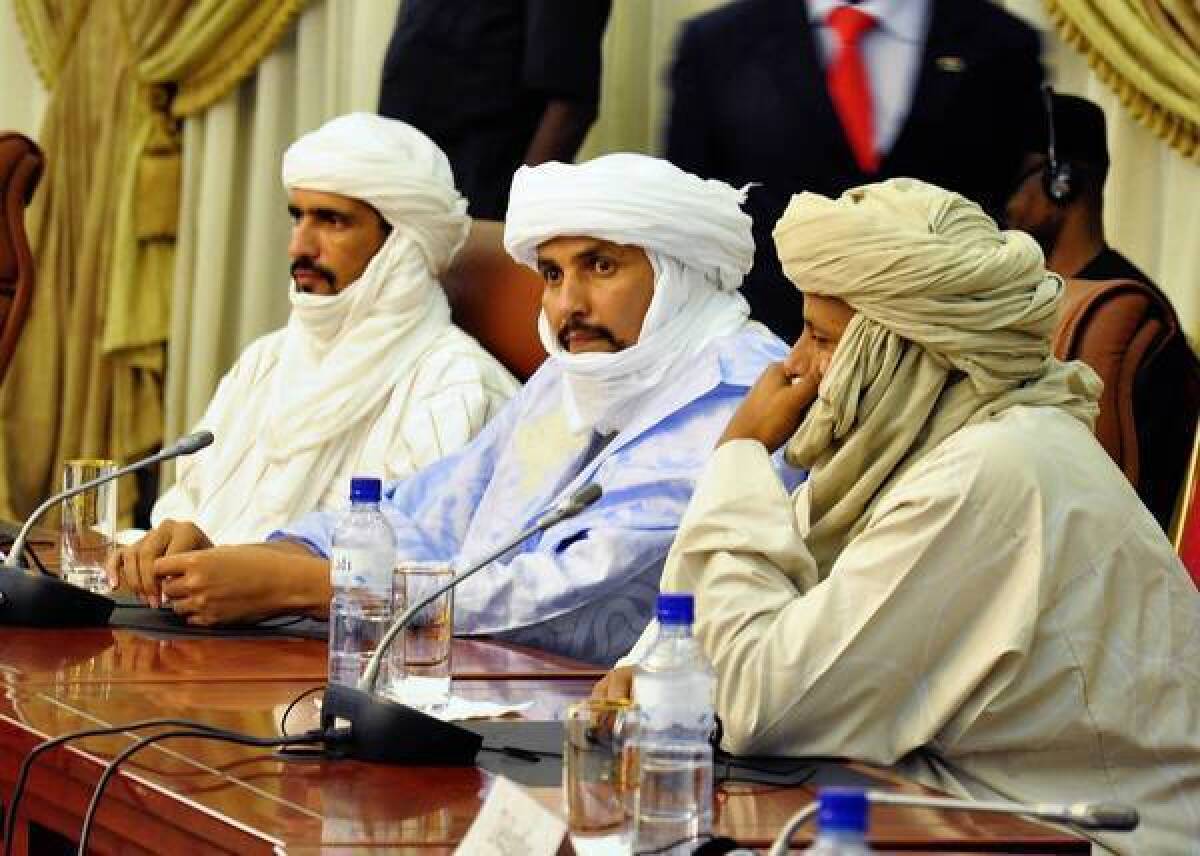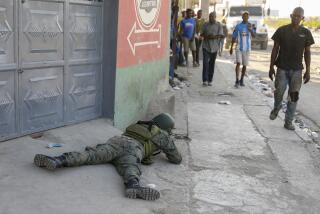Plan for military intervention in Mali stalls

- Share via
WASHINGTON — Plans for an international military intervention in the West African nation of Mali, where Islamists loyal to Al Qaeda are among militants who have seized the northern half of the country, are running into major obstacles even as U.S. officials warn that the terrorist threat there is growing.
West African countries have agreed to send 3,300 troops to help Malian forces oust the militants, and they have asked for a United Nations mandate as well as intelligence and logistical support from the United States and European allies. But the mission is considered so challenging — and the African operational plan so incomplete — that Western nations have yet to pledge financial support and now say the force might not be deployed until autumn 2013.
West African leaders condemn the delay, calling it “an expression of weakness against terrorists.” But it also reflects northern Mali’s forbidding terrain and the reluctance of the U.S. and its allies to get embroiled in another complex, far-off conflict in a predominantly Muslim nation.
U.N. Secretary-General Ban Ki-moon has raised concerns about the African proposal, writing in a report last week that “fundamental questions on how the force would be led, sustained, trained, equipped and financed remain unanswered.” Diplomats also say that Mali’s army, decimated by internal tension and defections, isn’t ready to lead an offensive against the well-armed militants, even with outside help.
The trouble in Mali stems from a military coup in March that toppled a democratically elected government and created a vacuum in the impoverished nation’s arid and lightly populated north.
Long-marginalized ethnic Tuaregs seized control in the Texas-size area, but they soon were outgunned by Islamist militant groups, including Al Qaeda in the Islamic Maghreb, or AQIM, the terrorist organization’s North African branch.
The Islamist militants have been blamed for human rights violations, including torture, recruitment of child soldiers and summary executions of those who run afoul of their harsh interpretation of Islamic sharia law.
More than 400,000 civilians have fled their homes, half of them to neighboring countries. The crisis has exacerbated a food shortage, with the U.N. estimating that 600,000 children under 5 face severe malnutrition.
European and West African officials are worried that AQIM — which the Pentagon calls Al Qaeda’s best financed and equipped branch — will use northern Mali as a base to attract foreign militants and to attack other countries. France, Mali’s former colonial ruler, is particularly fearful of being targeted and is pushing for a U.N. Security Council resolution authorizing the military intervention before the end of the year.
Even if the Security Council signs off, diplomats say, the force is unlikely to deploy before September.
Speaking to the council Wednesday, Jeffrey Feltman, the U.N. undersecretary-general for political affairs, called military intervention “a last resort to deal with the most hard-line extremists and criminal elements in northern Mali.”
U.S. officials also show signs of ambivalence toward the use of outside force.
Gen. Carter Ham, the commander of U.S. Africa Command whose forces would probably be asked help train and equip the West African soldiers, told an audience in Washington this week, “I don’t know how to describe [northern Mali] any other way than as a safe haven for Al Qaeda in the Islamic Maghreb.”
But Ham said that a military intervention today “would be unsuccessful” and set back anti-terrorism efforts “even further than they are today.”
Amanda Dory, deputy assistant secretary of Defense for African affairs, told a Senate hearing Wednesday that the Pentagon sent military planners to assist the regional Economic Community of West African States in drawing up a proposal for the force. The Pentagon is considering whether to provide further support, but no U.S. troops would be deployed to Mali, she added.
“The broad strategic concept for [the African] deployment is sound,” Dory said in prepared testimony. “More specific planning is underway to address operational shortfalls.”
The Pentagon, which has provided training to the Malian army for years under a regional counter-terrorism initiative, suspended direct assistance after the coup. U.S. forces continue to run training programs in other countries, including Nigeria, Niger and Mauritania, that would contribute troops to a Mali mission.
Some diplomats question the wisdom and cost of a military campaign to root out relatively few fighters — U.S. estimates of the presence of hard-line militants range from 800 to about 2,000 men — in a vast desert with no military bases and few obvious supply lines.
“You cannot really fight a conventional war there,” said Abdallah Baali, Algeria’s ambassador to Washington. “Your enemy will vanish in the desert before your eyes.”
U.S. officials are backing West African efforts to broker a political solution with some of the militants. After talks this week in Burkina Faso, one of the Islamist groups, Ansar Dine, pledged to reject terrorism.
But two more powerful Islamist factions, including AQIM, skipped the talks. And Mali’s military junta and interim government have yet to schedule fresh elections, raising questions about the durability of any truce.
Some experts believe that resolving Mali’s political disputes will take too long and that only a swift military intervention can stop human rights abuses and restore the country’s territorial integrity.
“Intervention must be given higher priority over elections and over negotiations, vital as those two are,” Nii Akuetteh, an independent policy analyst, told a Senate subcommittee Wednesday.
More to Read
Sign up for Essential California
The most important California stories and recommendations in your inbox every morning.
You may occasionally receive promotional content from the Los Angeles Times.











